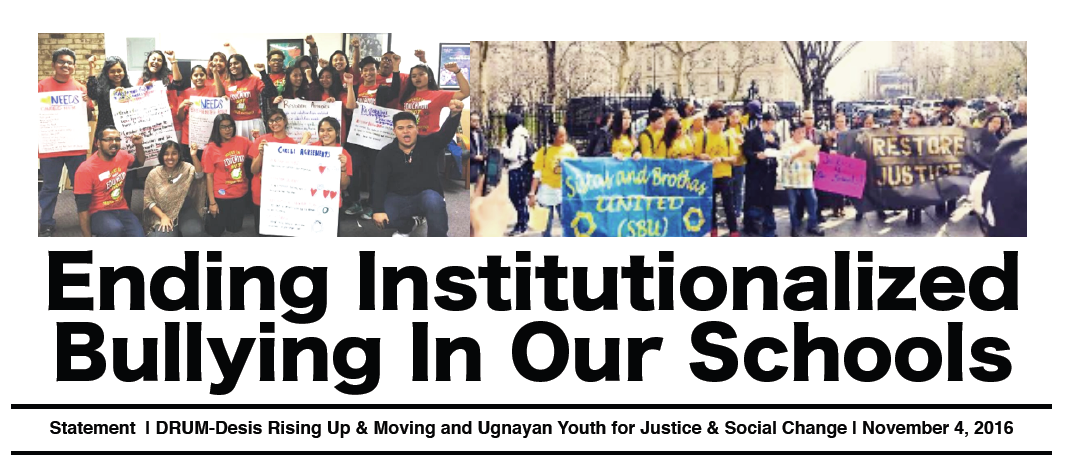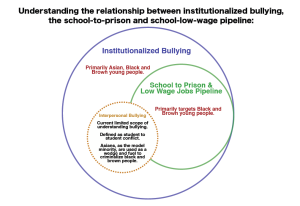Ending Institutionalized Bullying In Our Schools

When most people hear of the term “bullying” they think about several things at once: school, a classmate, school fights, name-calling, relentless harassment, and many other unpleasant memories. However, how many people think about why the bullying behavior exists in the first place?
We expect our education system to develop young people as human beings, but instead we have an education system that oppresses young people, seeing them as needing to be controlled and dominated instead of being fully capable and intelligent. This is called young people’s oppression and it’s normalized in our schools. It is young people’s oppression that upholds an environment where teachers, school staffs, School Security Agents (SSAs) or NYPD officers dehumanize and harm students. When adults who are authorities in the school system enact young people’s oppression on students, we do not usually think of this as a form of bullying, but it is. In fact, its “institutionalized” bullying because it’s embedded in the very fabric of the education system. Teachers, school administrators, police and security guards all have the protections that come with having unions, employment contracts and their position as adults. Young people in schools do not have any of these kinds of protections within the education institution.
Institutionalized bullying affects all young people in the educational system, but it impacts students differently based on race, class, gender, immigration status, sexual orientation, race, ethnicity, religion, language, and disability among other things. You may be familiar with one particularly violent way Institutionalized Bullying impacts primarily Black and Latino young people – the School-to-Prison Pipeline, and another version the School-To-Low-Wage-Jobs Pipeline. As DRUM and Ugnayan youth members, we believe that the presence of law enforcement and use of harsh Zero-Tolerance discipline policies actively promote and condone institutionalized bullying of youth of color in the NYC public schools by pushing them into the School-to-Prison-and-Low-Wage-Jobs-Pipeline.
Currently, the NYC School Discipline Code is based on Zero-Tolerance, where the root causes or the “why” behind a student’s behavior is never asked or addressed, it is simply responded to with punishment. Rather than nurturing young people to learn and grow from mistakes, youth of color are simply removed and isolated with use of harsh discipline. And yet, Zero-Tolerance discipline does not apply to adults if they bully students, or uphold a culture of bullying.
We often think of bullying is a harmful interpersonal encounter between students, and the way to reduce it is to implement more disciplinary policies. However, if we understand bullying as something that is fundamentally a part of the educational system and enacted by authority figures and police officers on youth of color, the solution can’t be to implement more of the same policies that institutionalize bullying. We have to look more closely at what’s happening to our young people in the school system.

As Asian students of Filipino and South Asian descent, DRUM and Ugnayan youth understand how we’re used as a wedge to criminalize Black and Latino students and push them into the School-to-Prison pipeline. Institutionalized bullying targets our Black and Latino peers in this particularly violent way; though we are reported to experience a high rate of interpersonal bullying, we are also regularly given lesser punishment than our Black and Latino kin for the same action. Asian American and Pacific Islander (API) youth experience oppressions in a different way than our Black and Latino kin. While API youth experience the highest rates of bullying in school (54% of high school youth who reported they had been bullied in NYC were Asian American, March 2014), we are conditioned to become the middle people who may be able to benefit from the status quo (the ‘model minority’). API students often become a wedge used to criminalize our Black and Latino kin, divide us from them, and fuel the school-to-prison pipeline. We will not stand for this — as Asian students, we want all bullying to end, and this cannot mean implementing policies that target and criminalize our Black and Brown peers.
No one wins in institutionalized bullying. Adults who are a part of this system as teachers and parents are set-up and trained to be complicit in targeting young people and maintaining institutionalized bullying. Teachers end up controlling, managing and policing young people as part of their expected role and are often punished when they act against the norms of the oppressive education system. When parents try to advocate for their children, the racism and classism of the education system prevents them from being an ally to young people; they are excluded from fully participating in shaping the quality of life of young people in schools. For example, new immigrants face additional cultural and social barriers, working class parents are shamed for not having the resources to be present at every step of the young person’s educational development, and Black and Brown parents are criticized for resourcefully figuring out how to raise their young people in a white supremacist society.
Teachers and parents aren’t bullied institutionally like young people; instead, teachers are manipulated and racism and classism targets parents to be agents of oppression. As a consequence, young people are blamed for doing poorly in school and lose their teachers and parents as natural allies. When parents and teachers understand how institutionalized bullying works, they have an opportunity to undo its damage and reclaim their integrity. Specifically, parents and teachers must play a role in dismantling institutionalized bullying and back the leadership of young people in transforming and creating an education system that truly serves their interests and well-being.
We want an end to institutionalized bullying, which is toxic to all people in our education system, from teachers to students to parents. We need to take action to undo this harmful system and adults need to unlearn the ways they are trained to be agents of young people’s oppression. The first step to doing this is ending all forms of Zero-Tolerance policies in the school district’s Discipline Code and removal of police and School Security Agents from all educational setting, mandating guidance interventions, resources and policies made to implement alternatives to suspensions, arrests and expulsions. Only through these changes happening can we begin to place young people at the center of their own transformation and empowerment, so they can take the lead on their development and fullest capacity as human beings.
